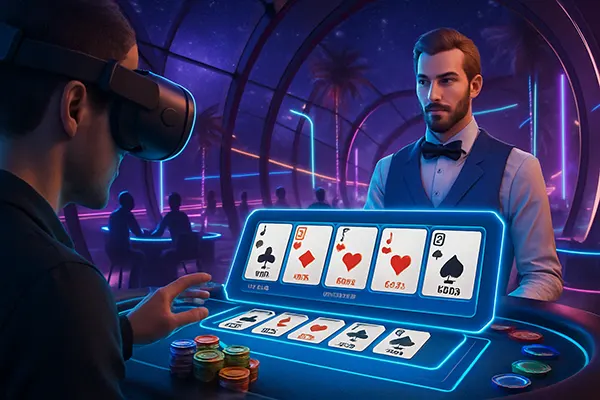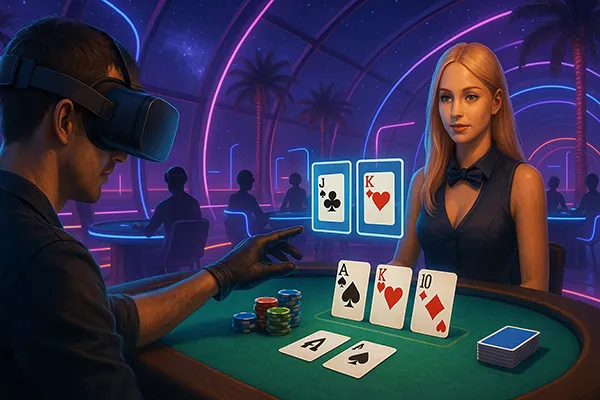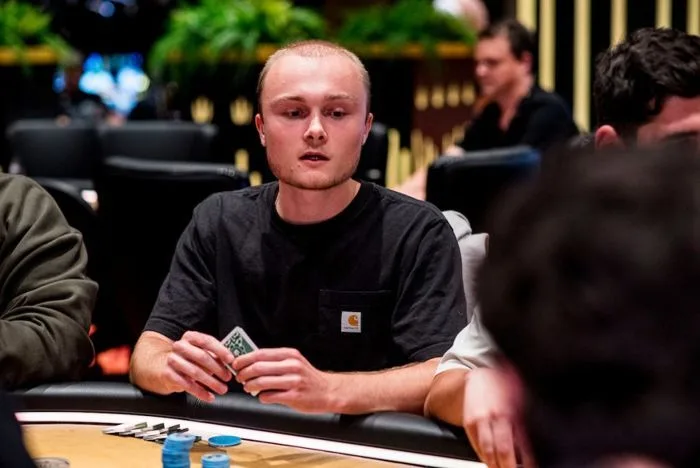
How Video Poker Integrates with the Metaverse: The Future of VR Casinos
The convergence of video poker and the Metaverse is redefining the boundaries of online gambling. As technology continues to progress, traditional forms of digital poker are undergoing an immersive transformation. The combination of virtual reality (VR), decentralised networks, and blockchain-based economies is crafting a new realm for players—where interactivity, realism, and connectivity become inseparable from gameplay.
The Role of Video Poker in Next-Gen Virtual Casinos
Video poker has long been a staple in both physical and online casinos, appealing to players who appreciate a combination of skill and chance. In the Metaverse, this game is gaining renewed attention by offering new forms of immersion. Instead of clicking a mouse or tapping a screen, players now interact with holographic interfaces, virtual dealer avatars, and 360-degree environments that simulate high-end Vegas-style poker lounges.
Virtual casinos within Metaverse platforms such as Decentraland and Somnium Space are already showcasing these capabilities. Players can walk into a VR poker room using an avatar, sit at a table, and play hands of video poker against AI opponents or real individuals from across the globe. This is not merely cosmetic—it adds social dynamics and visual depth that were previously absent in digital poker experiences.
Additionally, in-game token systems are integrated to support both free and crypto-based betting, ensuring secure transactions through blockchain. These innovations are providing players with autonomy, transparency, and instant accessibility, key features that align with modern expectations in the gambling landscape.
Social Features and Immersive Interactions
Unlike earlier online poker platforms, Metaverse casinos are fostering more natural and engaging interactions. Players can communicate via spatial audio, exchange virtual gestures, and form temporary alliances or rivalries. This creates a much more sociable and lifelike experience, akin to playing at a real poker table with friends or strangers.
Events such as poker tournaments now occur in fully rendered environments, complete with audience seating, ambient music, and live commentators, heightening the entertainment value. For professional players or streamers, these settings are ideal for showcasing skill in a dynamic and public manner, opening new doors for monetisation and audience engagement.
The combination of AI moderation and decentralised governance ensures fair play, with smart contracts handling rules and payouts. This level of oversight enhances trust among participants, particularly in an ecosystem where user anonymity is often preserved through decentralised avatars and blockchain wallets.
Technological Foundations and Hardware Compatibility
The engine behind VR video poker in the Metaverse includes technologies such as Web3, blockchain, and game engines like Unity and Unreal Engine 5. These platforms facilitate high-fidelity environments and real-time interactions, making the virtual gambling experience seamless and visually compelling.
On the hardware side, compatibility is expanding rapidly. Devices such as the Meta Quest 3, Apple Vision Pro, and HTC Vive XR Elite are enabling smoother, wire-free VR gameplay. These headsets provide high refresh rates and spatial tracking, allowing players to physically mimic card-dealing movements or gesture-based betting actions in real time.
Such integration is not only elevating user experience but also democratising access. VR video poker is becoming available on multiple tiers—from high-end immersive rigs to simplified versions playable via desktop browsers with optional 3D environments—ensuring that entry barriers remain low.
Cross-Platform Play and Interoperability
To attract broader audiences, Metaverse casinos are embracing interoperability. This allows users from different VR platforms or even 2D screens to interact within the same poker session. Such cross-platform features ensure that no user is excluded due to their hardware limitations or geographic location.
Wallet integrations through MetaMask, Phantom, and Coinbase Wallet further enhance flexibility, allowing players to use various cryptocurrencies such as Ethereum, Solana, and USDT for deposits and withdrawals. This also enables seamless movement of assets between different virtual worlds, contributing to the decentralised identity of the Metaverse gambling space.
Moreover, APIs and SDKs are being developed to let third-party developers create custom video poker environments. These community-driven enhancements boost variety and engagement, fostering a rich and evolving ecosystem that reflects user demand rather than centralised design decisions.

Legal, Ethical and Regulatory Challenges
Despite the technological advancements, the integration of video poker into the Metaverse raises critical questions about regulation. Unlike traditional online casinos, which are bound by geographic jurisdiction, Metaverse-based platforms often operate in decentralised environments. This makes it difficult for regulators to monitor compliance and enforce consumer protection laws.
As of early 2025, several jurisdictions, including the UK Gambling Commission and the Malta Gaming Authority, have begun drafting frameworks aimed at regulating VR casinos. These include guidelines for age verification, anti-money laundering (AML) procedures, and fair gameplay audits—all essential to protect vulnerable users and ensure responsible operation.
Concerns around data privacy are also prevalent, especially when combined with biometric data collected via VR hardware. Ethical handling of this sensitive data is essential, and forward-looking platforms are investing in end-to-end encryption and user-consent protocols to mitigate abuse or exploitation.
Responsible Gambling and Digital Well-being
One of the key concerns in VR-based gambling is user well-being. The immersive nature of video poker in the Metaverse can make it harder for players to recognise how much time or money they are spending. To address this, developers are incorporating responsible gambling tools, such as real-time spend trackers, break reminders, and enforced cooldown periods after heavy activity.
Additionally, user education is becoming a central theme, with tutorial rooms, AI advisors, and support hubs embedded within the VR environment. These features aim to equip users with knowledge and help prevent compulsive gambling behaviour, especially among younger players attracted by the novelty of VR experiences.
Partnerships with mental health organisations are also being explored, ensuring users can access professional support if needed. This is a crucial step toward creating a safe, transparent, and supportive ecosystem for digital gamblers in the age of immersive technology.
Popular topics
-
 Petrangelo Shakes Off Triton Hoodoo: ...
Petrangelo Shakes Off Triton Hoodoo: ...In the realm of high-stakes poker, few events garner …
-
 How to Recognise an Opponent’s Change...
How to Recognise an Opponent’s Change...In live and online poker alike, opponents rarely play …
-
 Rising Through the Ranks: A Newcomer&...
Rising Through the Ranks: A Newcomer&...High stakes poker is not for the faint of …
